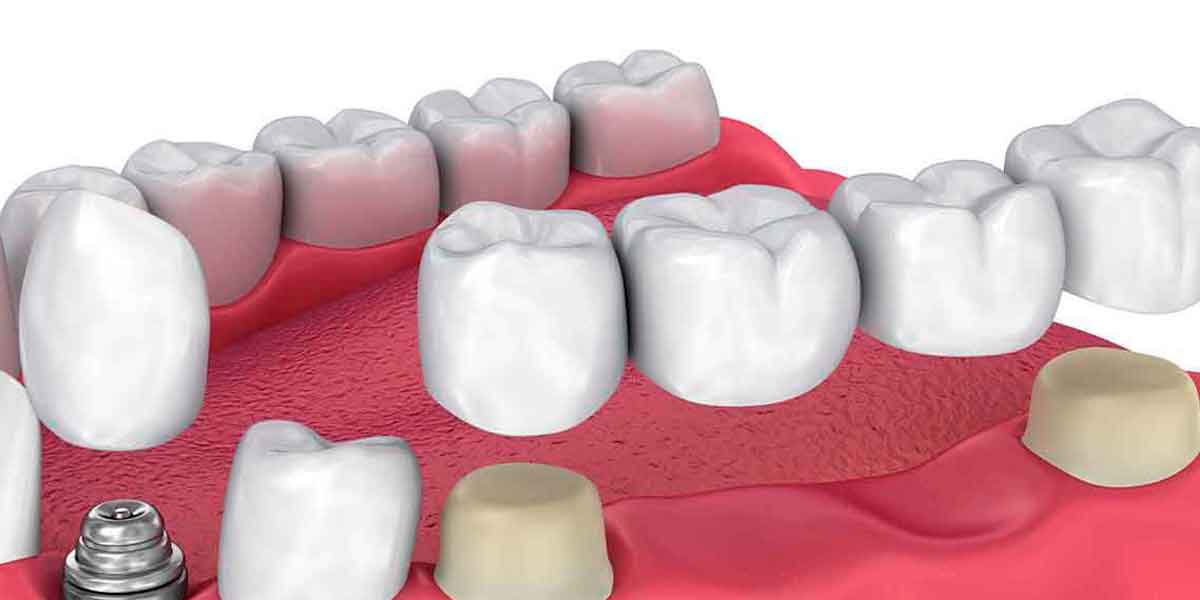When it comes to replacing missing teeth, dental implants and bridges are two of the most commonly considered options. Both aim to restore the functionality and appearance of your smile, but they differ significantly in terms of procedure, durability, and benefits. This article will provide a detailed comparison of dental implants and bridges to help you determine which might be the best fit for your dental needs.
What Are Dental Implants?
Dental implants are artificial roots made from biocompatible materials such as titanium. These implants are surgically embedded into the jawbone, where they gradually integrate with the bone, creating a solid base for a replacement tooth, bridge, or denture.
Steps Involved in Getting Dental Implants
The dental implant process includes several stages:
- Initial Evaluation: The dentist examines your oral health and bone density to confirm your suitability for implants.
- Surgical Insertion: The implant is surgically placed into the jawbone under local anesthesia.
- Osseointegration: Over a few months, the implant fuses with the jawbone, forming a stable foundation.
- Abutment Attachment: An abutment is connected to the implant, serving as a link to the replacement tooth.
- Final Restoration: A custom-made crown, bridge, or denture is affixed to the abutment.
Advantages of Dental Implants
- Long-Lasting: With proper care, dental implants can last a lifetime.
- Natural Look and Feel: Implants closely resemble and function like natural teeth.
- Bone Health: Implants stimulate the jawbone, preventing bone loss.
- Preservation of Adjacent Teeth: Implants do not require modification of neighboring teeth.
What Are Dental Bridges?
Dental bridges are fixed prosthetic devices designed to replace one or more missing teeth by anchoring to adjacent natural teeth or dental implants. A bridge typically includes one or more artificial teeth (pontics) supported by crowns on the neighboring teeth.
Steps Involved in Getting Dental Bridges
The procedure for obtaining a dental bridge involves the following steps:
- Initial Consultation: The dentist assesses your oral health and recommends the most suitable type of bridge.
- Tooth Preparation: The adjacent teeth are reshaped to fit the crowns that will support the bridge.
- Impressions: Impressions of your teeth are taken to create a custom bridge.
- Temporary Bridge: A temporary bridge is placed while the permanent one is being fabricated.
- Final Placement: The custom-made bridge is fitted, adjusted, and cemented into place.
Advantages of Dental Bridges
- Faster Process: Bridges generally require fewer appointments and less healing time compared to implants.
- Effective Restoration: Bridges effectively restore both function and appearance.
- Cost-Effective: Initially, bridges are less expensive than implants.
- Non-Surgical: Bridges do not require surgery, making them a viable option for patients who cannot undergo implant surgery.
Dental Implants vs. Bridges: A Comparative Analysis
Both dental implants and bridges have their unique benefits and drawbacks. Here are some critical factors to consider when deciding between the two:
Durability and Lifespan
Dental implants are renowned for their durability and can last a lifetime with proper care. On the other hand, bridges may need replacement every 10 to 15 years due to wear and tear or changes in the supporting teeth.
Aesthetic and Functional Outcomes
Both implants and bridges can deliver natural-looking results. However, dental implants often provide superior aesthetics and functionality as they replicate the structure of natural teeth. While bridges can also look natural, they may not feel as authentic as implants.
Effect on Adjacent Teeth
Dental implants do not affect adjacent teeth. In contrast, bridges require the reshaping of neighboring teeth to support the bridge, which can weaken those teeth and increase their susceptibility to decay and damage.
Bone Health
A significant advantage of dental implants is their ability to preserve the jawbone. Implants stimulate the bone, preventing the bone loss that typically occurs after tooth loss. Bridges do not offer this benefit, and the jawbone under the missing tooth may deteriorate over time.
Cost Analysis
Initially, dental implants are more expensive than bridges. However, considering their longevity and the potential need for bridge replacement in the future, implants may be more cost-effective in the long run. It’s essential to weigh both the short-term and long-term costs when making a decision.
Surgical vs. Non-Surgical Options
Dental implants require surgery, which might not be suitable for everyone, especially those with certain medical conditions or insufficient bone density. Bridges, being a non-surgical option, are more accessible for patients who cannot undergo surgery.
Deciding Between Dental Implants and Bridges
Choosing between dental implants and bridges depends on various factors, including your oral health, budget, and personal preferences. Consulting with a qualified dentist is crucial to determine the best option for your specific needs.
Key Considerations
- Oral Health: Evaluate the condition of your teeth, gums, and jawbone.
- Budget: Consider the initial and long-term costs of each option.
- Medical History: Discuss any medical conditions that may affect your ability to undergo surgery.
- Aesthetic Goals: Determine which option provides the desired aesthetic results.
- Long-Term Goals: Consider the longevity and maintenance requirements of each option.
Consulting with Your Dentist
Your dentist will evaluate your oral health, take diagnostic images, and discuss your goals and concerns. They will provide a personalized recommendation based on your specific needs, helping you make an informed decision.
Final Thoughts
Both dental implants and bridges offer effective solutions for replacing missing teeth, each with its advantages and considerations. Dental implants provide a long-lasting, natural-looking, and bone-preserving option, while bridges offer a quicker, non-surgical, and cost-effective alternative. Ultimately, the best choice depends on your unique dental situation and goals. Consulting with a knowledgeable dentist will ensure you receive the best possible care and achieve a healthy, beautiful smile.




